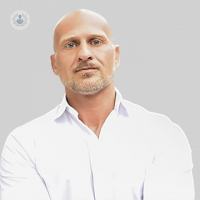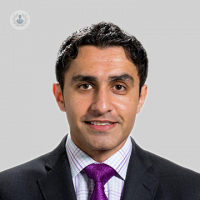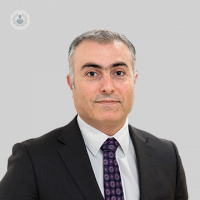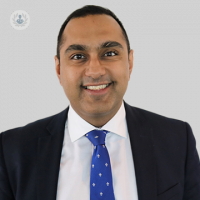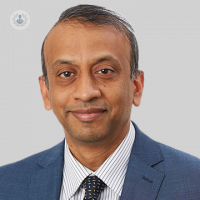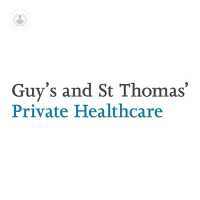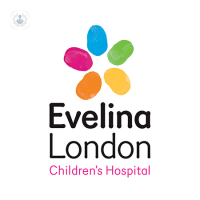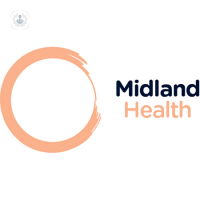What is snoring?
Snoring and obstructive sleep apnoea are disorders characterised by temporary upper airway occlusion at the pharynx level during sleep. This causes problems with sleep, fatigue and breathing, and other related problems.
What symptoms can be caused by snoring?
As well as snoring, in more severe cases breathing may stop (sleep apnoea) for more than 10 seconds, resulting in episodes of sleep disturbances throughout the night. These episodes cause oxygen deficiency in the brain, which can increase the risk of cardiovascular problems, diabetes, or stroke. The affected person may also suffer from drowsiness, general tiredness or depression, and may suffer from impaired concentration, affecting professional and personal performance.
What causes snoring?
The most common causes of snoring and sleep apnoea are obesity, nasal obstruction (polyps, deviated septum), an elongated soft palate, and hypothyroidism, among others. The common denominator in all situations is that there is a permanent or functional narrowing, which can have its origin at various levels of the upper airway. This produces an intense vibration on the walls of the pharynx, which transforms into the sound we perceive as snoring.
Can snoring be prevented?
It is difficult to prevent snoring but steps can be taken to improve it. For example:
- Snoring is made worse by sleeping on your back, so avoid sleeping in this position.
- Dry air may irritate and inflame the nasal mucosa. Placing a humidifier in the room may be helpful.
- Some foods contain allergens that provoke reactions and may cause a narrowing of the airways. These should be identified in order to check for possible allergies.
- Avoid alcoholic beverages in the evening, as alcohol relaxes the muscles of the pharynx, causing the air to vibrate as it passes, which then results in snoring.
- Certain sleep medications worsen snoring and the severity of sleep apnoea.
- Smoking dries and inflames the mucous membranes and is therefore strongly discouraged.
- It may be helpful to raise the headboard of your bed or use more than one pillow.
- Surgery may be an alternative, especially in cases of anatomical anomalies.
How can snoring be treated?
Treatment can be based on weight loss, changing lifestyle habits, and giving up smoking and drinking. You can also use a nasal mask that provides air pressure controlled by a mechanical device (CPAP), or you can have surgery.
Surgery may be helpful for anatomical abnormalities such as a deviated nasal septum or thickening of the uvula and soft palate. Non-invasive surgical techniques performed under local anaesthetic have been used for years now and they offer rapid postoperative recovery. Another non-invasive alternative is a mandibular advancement device. This is a kind of "dental sleeve" that you wear when sleeping. It moves the lower jaw forward of the upper jaw, thus widening the retrolingual area. It helps prevent snoring and sleep apnoea, is simple to use and has an easy adaptation process.
11-13-2012 09-05-2023Snoring
Dr Fabio Fanfoni - Otolaryngology / ENT
Created on: 11-13-2012
Updated on: 09-05-2023
Edited by: Jay Staniland
What is snoring?
Snoring and obstructive sleep apnoea are disorders characterised by temporary upper airway occlusion at the pharynx level during sleep. This causes problems with sleep, fatigue and breathing, and other related problems.
What symptoms can be caused by snoring?
As well as snoring, in more severe cases breathing may stop (sleep apnoea) for more than 10 seconds, resulting in episodes of sleep disturbances throughout the night. These episodes cause oxygen deficiency in the brain, which can increase the risk of cardiovascular problems, diabetes, or stroke. The affected person may also suffer from drowsiness, general tiredness or depression, and may suffer from impaired concentration, affecting professional and personal performance.
What causes snoring?
The most common causes of snoring and sleep apnoea are obesity, nasal obstruction (polyps, deviated septum), an elongated soft palate, and hypothyroidism, among others. The common denominator in all situations is that there is a permanent or functional narrowing, which can have its origin at various levels of the upper airway. This produces an intense vibration on the walls of the pharynx, which transforms into the sound we perceive as snoring.
Can snoring be prevented?
It is difficult to prevent snoring but steps can be taken to improve it. For example:
- Snoring is made worse by sleeping on your back, so avoid sleeping in this position.
- Dry air may irritate and inflame the nasal mucosa. Placing a humidifier in the room may be helpful.
- Some foods contain allergens that provoke reactions and may cause a narrowing of the airways. These should be identified in order to check for possible allergies.
- Avoid alcoholic beverages in the evening, as alcohol relaxes the muscles of the pharynx, causing the air to vibrate as it passes, which then results in snoring.
- Certain sleep medications worsen snoring and the severity of sleep apnoea.
- Smoking dries and inflames the mucous membranes and is therefore strongly discouraged.
- It may be helpful to raise the headboard of your bed or use more than one pillow.
- Surgery may be an alternative, especially in cases of anatomical anomalies.
How can snoring be treated?
Treatment can be based on weight loss, changing lifestyle habits, and giving up smoking and drinking. You can also use a nasal mask that provides air pressure controlled by a mechanical device (CPAP), or you can have surgery.
Surgery may be helpful for anatomical abnormalities such as a deviated nasal septum or thickening of the uvula and soft palate. Non-invasive surgical techniques performed under local anaesthetic have been used for years now and they offer rapid postoperative recovery. Another non-invasive alternative is a mandibular advancement device. This is a kind of "dental sleeve" that you wear when sleeping. It moves the lower jaw forward of the upper jaw, thus widening the retrolingual area. It helps prevent snoring and sleep apnoea, is simple to use and has an easy adaptation process.
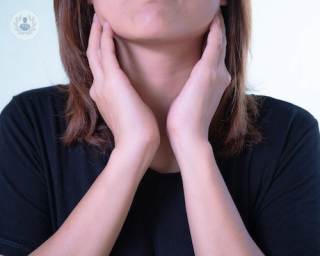

All you need to know about tonsillitis
By Mr Nick Hamilton
2024-11-21
Revered consultant ENT surgeon Mr Nick Hamilton gives an all-you-need-to-know guide to tonsillitis in this informative article for patients. See more
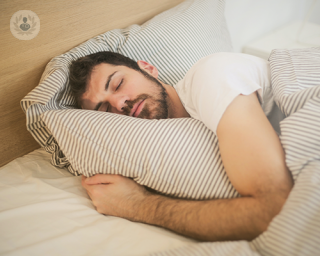

Snoring: when should you see a doctor?
By Mr Jonathan Hughes
2024-11-20
Snoring can be improved in most people - how this is achieved depends on the cause of the snoring. Mr Jonathan Hughes, an ENT (ear, nose and throat) specialist, clarifies the serious and non-serious causes of snoring, when to see a doctor and what to expect when being tested. He also explains the available treatments for snoring. See more


What causes snoring? OSA and snoring solutions
By Professor Guri Sandhu
2024-11-18
Snoring. Lots of us do it, but did you know that, sometimes, snoring can give you a bad night's sleep and, in turn, make you tired during the daytime and affect both your mental and physical health? Renowned ENT surgeon, Professor Guri Sandhu, explains all about obstructive sleep apnoea (OSA). See more


When snoring is serious: all about sleep apnoea
By Professor Bhik Kotecha
2024-11-14
40% of the UK population snore. In this article, we speak to highly esteemed consultant ENT surgeon Professor Bhik Kotecha to find out when snoring may be a sign of something more serious. See more
Experts in Snoring
-
Mr Ravinder Singh Natt
Otolaryngology / ENTExpert in:
- Blocked nose
- Hoarseness
- Tonsillitis
- Dysphagia
- Deafness
- Snoring
-
Mr Zaid Awad
Otolaryngology / ENTExpert in:
- Robotic surgery
- Neck lump
- Endoscopic sinus surgery
- Head and neck cancer
- Dysphagia
- Snoring
-
Mr Raj Lakhani
Otolaryngology / ENTExpert in:
- Rhinoplasty (nose job)
- Endoscopic sinus surgery
- Paediatric ENT
- Snoring
- Tonsillitis
- Facial plastic surgery
-
Mr Florian Bast
Otolaryngology / ENTExpert in:
- Septorhinoplasty
- Rhinoplasty (nose job)
- Sinusitis
- Facial plastic surgery
- Snoring
- Blepharoplasty
-
Mr Prasad Kothari
Otolaryngology / ENTExpert in:
- Snoring
- Difficult Swallowing (Dysphagia)
- Head and neck cancer
- Neck lump
- Thyroid surgery
- Paediatric ENT
- See all

Guy’s and St Thomas’ Private Healthcare
Guy’s and St Thomas’ Private Healthcare
Guy’s Hospital, Great Maze Pond
No existe teléfono en el centro.
By using the telephone number provided by TOP DOCTORS, you automatically agree to let us use your phone number for statistical and commercial purposes. For further information, read our Privacy Policy
Top Doctors

Evelina London Children's Hospital Private Healthcare
Evelina London Children's Hospital Private Healthcare
Floor 1 St Thomas' Hospital, Westminster Bridge Road, London. SE1 7EH
No existe teléfono en el centro.
By using the telephone number provided by TOP DOCTORS, you automatically agree to let us use your phone number for statistical and commercial purposes. For further information, read our Privacy Policy
Top Doctors

Midland Health Birmingham
Midland Health Birmingham
Midland Health, 23a Highfield Road
No existe teléfono en el centro.
By using the telephone number provided by TOP DOCTORS, you automatically agree to let us use your phone number for statistical and commercial purposes. For further information, read our Privacy Policy
Top Doctors
-
Guy’s and St Thomas’ Private Healthcare
Guy’s Hospital, Great Maze Pond, SE1 South Bank LondonExpert in:
- Allergy
- Cardiology
- General Surgery
- Maxillofacial Surgery
- Thoracic Surgery
- Maternity care
-
Evelina London Children's Hospital Private Healthcare
Floor 1 St Thomas' Hospital, Westminster Bridge Road, London. SE1 7EH, SE1 South Bank LondonExpert in:
- Paediatric Dermatology
- Child development
- Child Nutrition
- Paediatrics
- Preventive paediatrics
- Child health surveillance
-
Midland Health Birmingham
Midland Health, 23a Highfield Road, EdgbastonExpert in:
- Diagnostic Imaging
- Pregnancy
- Women’s health
- General practice
- Menopause
- Sexual health
- See all
- Most viewed diseases, medical tests, and treatments
- Migraine
- Autoimmune diseases
- Minimal access surgery (keyhole surgery)
- Head and neck cancer
- Neck lump
- Botulinum toxin (Botox™)
- Platelet-rich plasma
- Thyroid disorders
- Anti-ageing treatments
- Medicolegal
